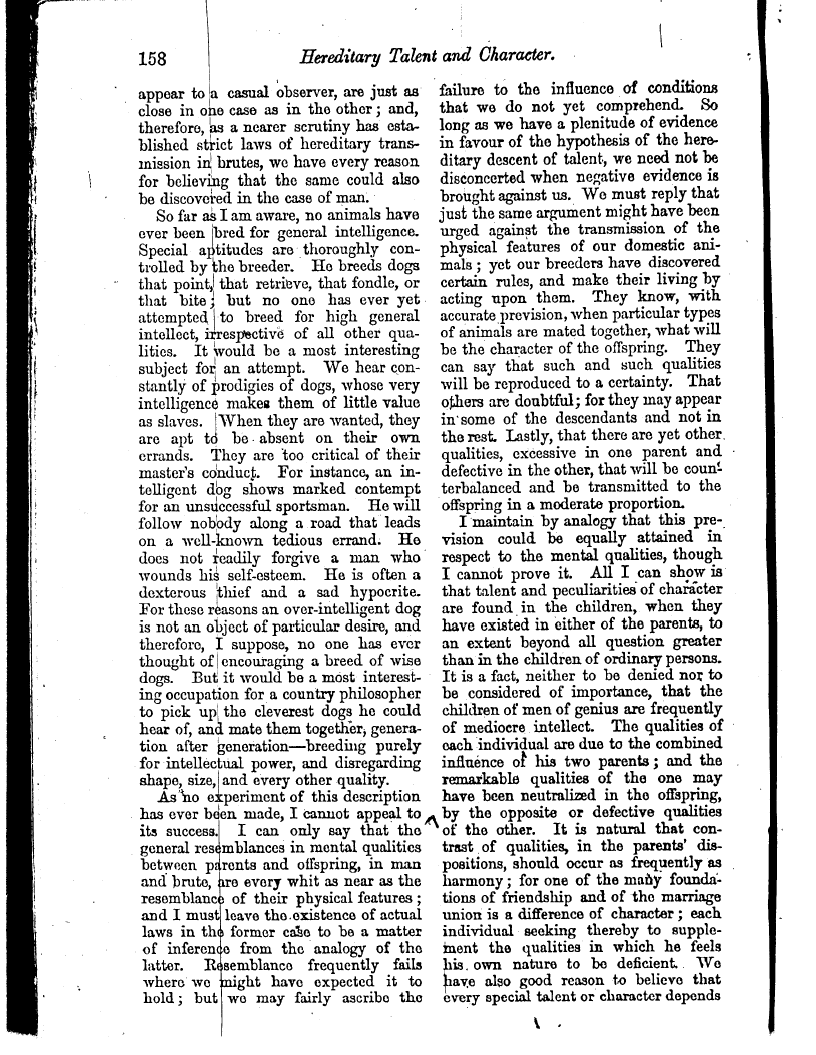OCR Rendition - approximate158
Hereditary Talent and Character.
appear to a casual observer, are just as close in one case as in the other ; and, therefore, as a nearer scrutiny has established strict laws of hereditary transmission in brutes, we have every reason
for believing that the same could also be discovered in the case of man.
So far as I am aware, no animals have ever been bred for general intelligence. Special a jtitudes are thoroughly controlled by the breeder. Ho breeds dogs that pointthat retriiwe, that fondle, or that bite,' but no one has ever yet attempted to breed for high general intellect, irrespective of all other qualities. It would be a most interesting subject for an attempt. We hear constantly of prodigies of dogs, whose very intelligence makes them of little value as slaves. When they are wanted, they are apt t be. absent on their own errands. They are too critical of their master's conduct. For instance, an intelligent dog shows marked contempt for an unsuccessful sportsman. Ho will follow nobody along a road that leads on a well-known tedious errand. He does not readily forgive a man who wounds his self-esteem. He is often a dexterous thief and a sad hypocrite. For these r9asons an over-intelligent dog is not an object of particular desire, and therefore, I suppose, no one has ever thought of I encouraging a breed of wise dogs. But it would be a most interesting occupation for a country philosopher to pick UPI the cleverest dogs he could hear of, and mate them together, generation after generation-breediiig purely for intellectual power, and disregarding shape, size, and every other quality.
As no e periment of this description
has ever been made, I cannot appeal to by the opposite or defective qualities its success.
general res between p and brute, resemblanc and I mus laws in th of inferen latter. R where' wve hold ; but
failure to the influence of conditions that we do not yet comprehend. So long as we have a plenitude of evidence in favour of the hypothesis of the hereditary descent of talent, we need not be
disconcerted when negative evidence is brought against us. We must reply that just the same argument might have been urged against the transmission of the physical features of our domestic animals ; yet our breeders have discovered certain rules, and make their living by acting upon them. They know, with accurate. prevision, when particular types of animals are mated together, what will be the character of the offspring. They can say that such and such qualities will be reproduced to a certainty. That ojhers are doubtful; for they may appear
in' some of the descendants and not in the rest. Lastly, that there are yet other, qualities, excessive in one parent and defective in the other, that will be count terbalanced and be transmitted to the offspring in a moderate proportion.
I maintain by analogy that this pre-n vision could be equally attained in
respect to the mental qualities, though I cannot prove it. All I can show is that talent and peculiarities of character are found in the children, when they have existed in either of the parents, to an extent beyond all question greater than in the children of ordinary persons. It is a fact, neither to be denied nor to be considered of importance, that the children of men of genius are frequently of mediocre intellect. The qualities of each individual are due to the combined influence of his two parents ; and the remarkable qualities of the one may
have been neutralized in the offspring,
I can only say that the of the other. It is natural that conmblances in mental qualities
rents and offspring, in man re every whit as near as the
of their physical features ; leave the. existence of actual former cafe to be a matter o from the analogy of the semblance frequently fails
'ght have expected it to we may fairly ascribe the
htrast. of qualities, in the parents' dispositions, should occur as frequently as harmony ; for one of the maify founds= tions of friendship and of the marriage union is a difference of character ; each individual seeking thereby to supplement the qualities in which he feels is . own nature to be deficient.. We ave also good reason to believe that every special talent or character depends
|

